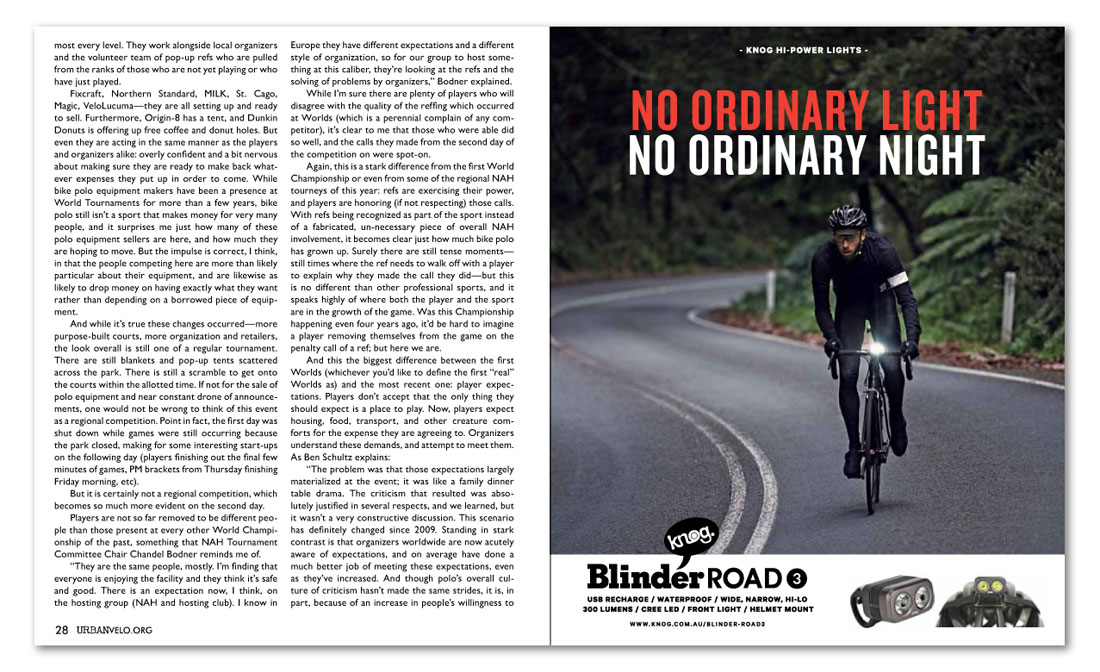


most every level. They work alongside local organizers and the volunteer team of pop-up refs who are pulled from the ranks of those who are not yet playing or who have just played.
Fixcraft, Northern Standard, MILK, St. Cago, Magic, VeloLucuma—they are all setting up and ready to sell. Furthermore, Origin-8 has a tent, and Dunkin Donuts is offering up free coffee and donut holes. But even they are acting in the same manner as the players and organizers alike: overly confident and a bit nervous about making sure they are ready to make back whatever expenses they put up in order to come. While bike polo equipment makers have been a presence at World Tournaments for more than a few years, bike polo still isn’t a sport that makes money for very many people, and it surprises me just how many of these polo equipment sellers are here, and how much they are hoping to move. But the impulse is correct, I think, in that the people competing here are more than likely particular about their equipment, and are likewise as likely to drop money on having exactly what they want rather than depending on a borrowed piece of equipment.
And while it’s true these changes occurred—more purpose-built courts, more organization and retailers, the look overall is still one of a regular tournament. There are still blankets and pop-up tents scattered across the park. There is still a scramble to get onto the courts within the allotted time. If not for the sale of polo equipment and near constant drone of announcements, one would not be wrong to think of this event as a regional competition. Point in fact, the first day was shut down while games were still occurring because the park closed, making for some interesting start-ups on the following day (players finishing out the final few minutes of games, PM brackets from Thursday finishing Friday morning, etc).
But it is certainly not a regional competition, which becomes so much more evident on the second day.
Players are not so far removed to be different people than those present at every other World Championship of the past, something that NAH Tournament Committee Chair Chandel Bodner reminds me of.
“They are the same people, mostly. I’m finding that everyone is enjoying the facility and they think it’s safe and good. There is an expectation now, I think, on the hosting group (NAH and hosting club). I know in Europe they have different expectations and a different style of organization, so for our group to host something at this caliber, they’re looking at the refs and the solving of problems by organizers,” Bodner explained.
While I’m sure there are plenty of players who will disagree with the quality of the reffing which occurred at Worlds (which is a perennial complain of any competitor), it’s clear to me that those who were able did so well, and the calls they made from the second day of the competition on were spot-on.
Again, this is a stark difference from the first World Championship or even from some of the regional NAH tourneys of this year: refs are exercising their power, and players are honoring (if not respecting) those calls. With refs being recognized as part of the sport instead of a fabricated, un-necessary piece of overall NAH involvement, it becomes clear just how much bike polo has grown up. Surely there are still tense moments—still times where the ref needs to walk off with a player to explain why they made the call they did—but this is no different than other professional sports, and it speaks highly of where both the player and the sport are in the growth of the game. Was this Championship happening even four years ago, it’d be hard to imagine a player removing themselves from the game on the penalty call of a ref; but here we are.
And this the biggest difference between the first Worlds (whichever you’d like to define the first “real” Worlds as) and the most recent one: player expectations. Players don’t accept that the only thing they should expect is a place to play. Now, players expect housing, food, transport, and other creature comforts for the expense they are agreeing to. Organizers understand these demands, and attempt to meet them. As Ben Schultz explains:
“The problem was that those expectations largely materialized at the event; it was like a family dinner table drama. The criticism that resulted was absolutely justified in several respects, and we learned, but it wasn’t a very constructive discussion. This scenario has definitely changed since 2009. Standing in stark contrast is that organizers worldwide are now acutely aware of expectations, and on average have done a much better job of meeting these expectations, even as they’ve increased. And though polo’s overall culture of criticism hasn’t made the same strides, it is, in part, because of an increase in people’s willingness to